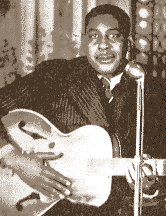Arthur "Big Boy" Crudup
Arthur "Big Boy" Crudup was born in Forrest, Mississippi in 1905. Crudup spent his childhood
in Forrest, Mississippi and later Indianapolis, Indiana where he started working at the age of thirteen when his
mother fell ill. He returned to Forrest in the Mid 1920ās married and started farming. He and his wife eventually
separated freeing Crudup from his settled life. He than began running from juke joint to juke joint, wherever he
could get a gig. He traveled up north in the mid 1930ās and eventually ended up in Chicago.
Times were hard for Crudup in the beginning. He lived in a packing crate under the "L" train in Chicago
when he first arrived in Chicago. Eventually Crudup was discovered by "Big" Bill Broonzy, an established
blues musician who set up gigs for Crudup. After his discovery Crudup was seen at a South side house party by talent
scout Lester Melrose. In 1941 Crudup recorded with RCA Victor/ Bluebird.
Crudup proved to be an impressive blues musician. He had made the "transition to electric country blues"(Lawrence Cohn, Nothing But the Blues(NBB): The Music and the Musicians, Abbeville Press, New York, 1993
p. 80) which was in high demand. Crudup had a style all his own. "He sang with passion in a high, strong
voice and played simple rhythmic figures on his amplified guitar in a style well suited to the new louder sound."(Cohn, NBB, p.80) Crudup met the demands of the newer, louder Chicago sound.
Crudup was unusual as he recorded for 13 straight years, at times when most record labels werenāt recording blues
musicians. He eventually moved away from RCA and began recording for Trumpet and Chess records under a false name
because he was still under contract with RCA. |
 |
In the late 1950ās early 1960ās Crudup fell out of sight. In 1967 he was rediscoved in Virginia by Bob Kestler
of Delmark records. Crudup toured from the moment of his rediscovery until his death in 1974.
Crudup never made much money off of his recordings "even after he was making records Īmade most of his
money from day jobs. During most of his years of R&B fame he worked as a porter in a West side liquor store.ā"
(Living Blues (LB) N16 SP 1974) He also never reaped all of the benefits of his writing.
Crudup wrote, "Thatās All Right",
and "My Baby Left Me" years before Elvis Priestly recorded them for Sun records in 1954. The songs became
instant successes, and this "established Big Boy as the ĪFather of Rock and Rollā (LB N16 SP
1974)."
However, the successful union of Crudupās lyrics with Elvisās voice and persona did not make Crudup a wealthy
man. Crudup was cheated, on more than one occasion, out of money from recordings and royalties. Crudup and others
looking out for his interests filled against his publisher for his royalties. It was also rumored that Melrose
"pocketed most of the royalties Crudup should have earned at RCA." (LB N16 SP 1974)
The money that was rightfully his lay "(t)ied up in litigation and red tape, an estimated $100,000 in royalties
had accumulated in his name, he said, but remained out of his reach."(Margaret McKee, and Fred
Chisenhall, Beale Black & Blue(B,B,B), Louisiana State University Press, Batton Rouge, 1981 p.206) Crudup
explained that his material had been used and profited from "because I didnāt write them on paper."(Mckee and Chisenhall, BBB p.206)
Crudup "died without ever seeing those royalties." (LB N16 SP 1974) In an interview
he asked:
Why they holding it for (the money)? They want me to die? If they pay it off when Iām dead, I couldnāt enjoy
it; and I canāt carry it with me, so let me enjoy a little of it while Iām here.(B,B,B p.214)
Apparently this was what the record labels were banking on, and Crudup passed on without receiving what he was
due.
Music Critique


